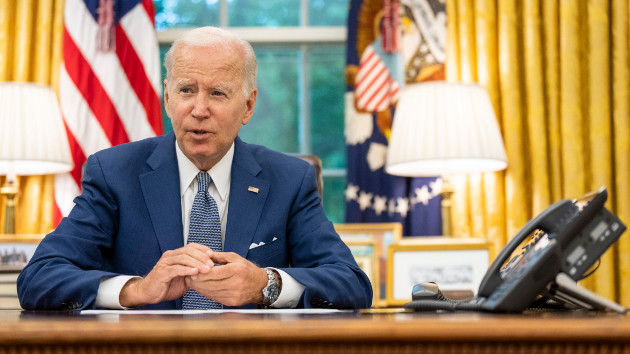
(WASHINGTON) — During a trip to Los Angeles Thursday, President Joe Biden told reporters he plans to speak with Saudi Arabia soon, following the OPEC+ decision to slash oil production.
Asked what his message would be to Saudi Arabia on the price of gas, Biden said “We’re, we’re about to talk to them,” but he wouldn’t give more details, simply telling reporters to “stay tuned.”
Meanwhile, the Biden White House and Saudi foreign ministry leveled accusations against each other amid fallout from the OPEC+ move.
The Saudi Foreign Ministry said in a lengthy statement Wednesday that the kingdom had turned down a U.S. request to delay the OPEC decision by a month — in effect, after the midterm elections in the U.S. — and took issue with any characterization that the decision “was politically motived against the United States of America.”
“The Government of the Kingdom of Saudi Arabia would first like to express its total rejection of these statements that are not based on facts,” the ministry said, adding: “This decision was taken unanimously by all member states of the OPEC+ group.”
The White House fired back Thursday, with spokesman John Kirby saying in a written statement that other OPEC nations have communicated to the U.S. “privately” that they disagreed with Saudi Arabia’s decision to cut oil production — but felt “coerced” to support it anyway. In a call with reporters, he declined to name the other countries but said “there was more than one.”
Saudi Arabia on Wednesday did vote in favor of a U.S.-backed United Nations resolution condemning Russia’s attempt to annex parts of Ukraine. While Kirby called the vote “welcome,” he said “it doesn’t erase the fact that the decision that OPEC+ made was unnecessary, mathematically speaking.”
That decision, he said, provided not just economic support to Russian President Vladimir Putin, but also moral and military support, “because it allows him to continue to fund his war-making machine and it certainly gave him, Mr. Putin, a sense of comfort here.”
It was a remarkable accusation to make about a longtime U.S. partner, albeit one with whom the U.S. relationship is rapidly fraying.
“The Saudi Foreign Ministry can try to spin or deflect, but the facts are simple,” Kirby said in the statement.
Kirby said the U.S. “presented Saudi Arabia with analysis to show that there was no market basis to cut production targets, and that they could easily wait for the next OPEC meeting to see how things developed.”
He said Saudi Arabia took the “wrong direction” by taking a “they knew would increase Russian revenues and blunt the effectiveness of sanctions” the U.S. and other Western nations had imposed in the wake of Russia’s aggression toward Ukraine.
For its part, the Saudi foreign ministry said it “clarified through its continuous consultation with the US Administration that all economic analyses indicate that postponing the OPEC+ decision for a month, according to what has been suggested, would have had negative economic consequences.”
On Tuesday, Kirby said Biden thinks the United States needs to “reevaluate” its relationship with Saudi Arabia, especially in light of the decision by the OPEC+ oil cartel to cut production.
“I think the president’s been very clear that this is a relationship that we need to continue to reevaluate, that we need to be willing to revisit,” Kirby said in an interview with CNN. “And certainly in light of the OPEC decision, I think that’s where he is.”
Kirby said Biden “is going to be willing to work with Congress as we think about what the right relationship with Saudi Arabia needs to be going forward.”
Sen. Bob Menendez, the New Jersey Democrat who chairs the Senate Foreign Relations Committee, on Monday called on the U.S. to “immediately freeze all aspects of our cooperation with Saudi Arabia, including any arms sales and security cooperation beyond what is absolutely necessary to defend U.S. personnel and interests.”
Other Democrats, Sen. Richard Blumenthal of Connecticut and Rep. Ro Khanna of California, on Wednedsay introduced a bill that would pause U.S. arms sales to Saudi Arabia for one year.
Biden on Wednesday declined to take a position on the legislation. Kirby said Thursday “future arms sales… are certainly going to be on the table.”
“We understand that there are no imminent pending arms sales to Saudi Arabia right now,” Kirby told reporters. “So there’s not– you know, we’re not going to rush to make some kind of judgment here.”
Copyright © 2022, ABC Audio. All rights reserved.
